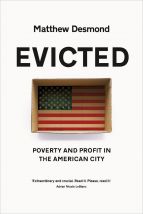Evicted: Poverty and Profit in the American City

It is impossible to read Evicted: Poverty and Profit in the American City by Matthew Desmond and not be significantly affected. As Desmond confesses himself, seeing the level of poverty and suffering that he did during his research “was heartbreaking and left me depressed for years” (page 328). Do not pass by this book out of fear of heartache, however. Through Desmond’s remarkable ethnographic research and other quantitative analysis, it offers a “new portrait of the powerful ways that the private housing sector is shaping the lives of poor American families and their communities” and the immense problem of eviction (page 333).
Desmond says this book was born out of his desire to write about poverty and to understand it as a relationship between the rich and poor. Through his search for a process that bound the rich and poor together, he came to eviction. As mentioned above, Evicted is informed by ethnographic research that Desmond predominantly carried out between May 2008 and December 2009 in the US city of Milwaukee in Wisconsin (page xi). He also subsequently carried out the Milwaukee Area Renters Study (MARS) between 2009 and 2011, which interviewed approximately 1,100 tenants and “collected new data on housing, residential mobility, eviction and poverty” (pages 329 to 330). Desmond carried out another study between January and February 2011: the Milwaukee Eviction Court Study. In addition to these studies, Desmond analysed a vast number of records to validate his observations and deepen his understanding. Thus, Evicted is built upon the rigorous study of a large number of data sources.
Evicted is written as a non-fiction story. Defined by three sections – Rent, Out, and After – it follows eight families who are caught up in the eviction process. Their names have been changed to protect identities, but their stories are true and have been witnessed firsthand by Desmond. By weaving their stories together, Desmond exposes that eviction is a cause and not just a precondition of poverty. He also emphasizes the extent to which housing “is implicated in the creation of poverty” (page 5). Through Evicted, Desmond highlights the unaffordability of Milwaukee and other American cities; he demonstrates that the lack of affordable housing is an endemic problem of poverty and arguably one of America’s most urgent issues to address (page 333).
In his epilogue, Desmond identifies the harmful affects of eviction such as instability, loss (which increases material hardship), suicide, and broken communities (which reduce people’s ability to work collectively for their betterment). Desmond argues for fundamental deep reform, and suggests publicly funded legal services for those facing eviction as well as adequate funding for housing courts (page 303). He also links poverty to exploitation, a product of extractive markets. Desmond thus promotes expanding America’s existing housing voucher programme into a Universal Housing Voucher programme to enable all low-income people to benefit (page 308). Although it would be more of a direct outlay, he argues that this would in fact cost the state less in total, given the potential savings from curbing the consequences of the affordable housing crisis (page 312).
Book note prepared by Hannah Keren Lee
Search the Book notes database
Our Book notes database contains details and summaries of all the publications included in Book notes since 1993 - with details on how to obtain/download.
Use the search form above, or visit the Book notes landing page for more options and latest content.
For a searchable database for papers in Environment and Urbanization, go to http://eau.sagepub.com/

